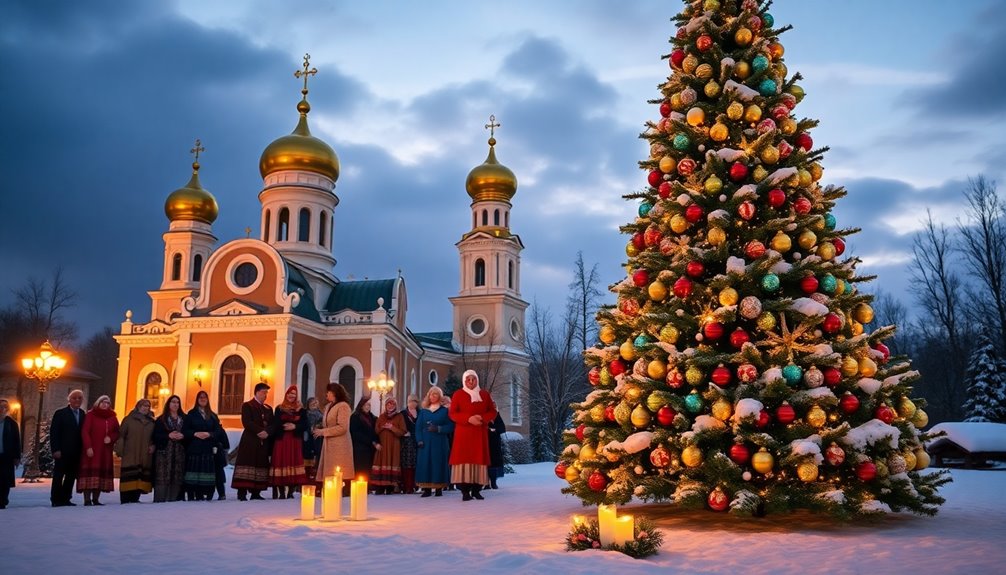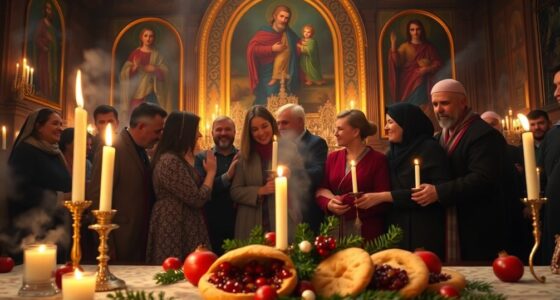Orthodox Christians celebrate Christmas on January 7 because they use the Julian calendar, which lags 13 days behind the Gregorian calendar most of the world follows. This tradition goes back to historical decisions made during the Council of Nicaea, which influenced when Easter—and consequently Christmas—was celebrated. A special 40-day fasting period leads up to the holiday, where families gather for a meal featuring 12 symbolic dishes. Unique customs, like joyful caroling, further enhance the celebration. By exploring these rich traditions deeper, you'll discover more about the vibrant customs surrounding Orthodox Christmas.
Key Takeaways
- Orthodox Christians celebrate Christmas on January 7 due to the Julian calendar, which has a 13-day discrepancy with the Gregorian calendar.
- The Council of Nicaea standardized the date of Easter, influencing the celebration of Christmas, leading Orthodox Christians to align with December 25 in the Julian calendar.
- A 40-day fasting period precedes Christmas, culminating in a festive meal featuring 12 traditional dishes, symbolizing family unity and cultural heritage.
- Unique customs, such as caroling and special church services, foster community spirit and emphasize the importance of family gatherings during the holiday.
- Ongoing discussions about calendar reform within Orthodox churches may lead to future shifts in celebration dates, reflecting evolving cultural identities and practices.
Historical Context of January 7

When you look at the historical context of January 7, it becomes clear that the date's significance stems from the Orthodox Church's adherence to the Julian calendar. Established by Julius Caesar in 46 BC, this calendar was used for centuries until the Gregorian calendar was introduced in 1582 by Pope Gregory XIII to fix its inaccuracies.
The Council of Nicaea in 325 AD set the groundwork for standardizing Easter's date, which indirectly influenced how Christmas is celebrated. Because the Julian calendar lags 13 days behind the Gregorian calendar, Orthodox Christians celebrate Christmas on January 7, which aligns with December 25 in the Julian calendar.
While some Orthodox groups celebrate on January 6, the majority hold firm to this tradition.
Calendar Differences Explained

While many people celebrate Christmas on December 25, the difference in dates between Orthodox and Western Christian traditions can be traced back to the calendars they use.
- Orthodox Christians follow the Julian calendar, which is currently 13 days behind.
- The Gregorian calendar, introduced in 1582, corrected the Julian calendar's inaccuracies.
- This calendar discrepancy guarantees Orthodox Christmas is celebrated on January 7.
As a result of these calendar differences, Orthodox Christians maintain their traditions rooted in the Julian calendar.
By 1923, the gap solidified January 7 as their Christmas celebration.
Curiously, in 2100, Orthodox Christmas will even fall on January 8 due to the ongoing drift of the Julian calendar.
Liturgical Practices and Customs

The celebration of Orthodox Christmas isn't just about the date; it's also rich with unique liturgical practices and customs that deepen the spiritual experience.
Leading up to this festive day, you'll observe a 40-day fasting period, abstaining from meat and dairy to focus on spiritual reflection.
On Christmas Eve, many communities gather for a special mass followed by a family meal featuring 12 traditional dishes, symbolizing Christ's apostles. A standout dish is Kutia, made of wheat, honey, and poppy seeds, representing family unity.
During Orthodox Christmas celebrations, you'll hear the greeting exchanged, "Christ is born!" met with "Glory to Him!"
These unique customs, including caroling and regional dishes, truly enrich the holiday spirit.
Global Observance of Orthodox Christmas

Celebrating Orthodox Christmas on January 7 creates a vibrant tapestry of traditions and customs across the globe. This date, rooted in the Julian calendar, unites diverse communities in heartfelt observance.
Here are three key aspects of this celebration:
- Cultural Heritage: Countries like Russia, Ukraine, and Greece showcase their rich traditions through public celebrations and religious services.
- Traditional Foods: Families gather to feast on special meals, emphasizing the importance of sharing and togetherness.
- Communal Worship: Large church services draw millions, particularly in Egypt's Coptic Orthodox community, reinforcing faith and unity.
Despite variations in customs, the essence of Orthodox Christmas on January 7 remains a profound connection to faith, family, and cultural heritage.
Unique Traditions Across Cultures

As you explore the unique traditions surrounding Orthodox Christmas, you'll find that regional food customs play a significant role in the celebrations.
Each culture brings its own flavors to the table, creating a rich tapestry of culinary delights.
Family gatherings also take center stage, fostering a sense of unity and joy during this special time.
Regional Food Customs
Across various cultures, Christmas food customs reveal a rich tapestry of traditions that reflect local histories and values.
These regional food customs are central to how families celebrate Orthodox traditions in January. Here are three unique dishes you might encounter:
- Kutia in Ukraine: A sweet mixture of wheat, honey, and poppy seeds, symbolizing unity.
- Fattah in Egypt: A festive meal of rice, bread, and meat, enjoyed after a 43-day fast.
- Doro Wat in Ethiopia: A spicy chicken stew served with injera, showcasing culinary heritage.
Each meal offers a glimpse into the culture's heart, making Christmas not just a holiday, but a celebration of community and history through food.
Unique Family Gatherings
Food brings families together during Christmas, but unique family gatherings also play a significant role in the celebration. Across different cultures, Orthodox traditions highlight the importance of community and family during this festive season.
| Country | Unique Tradition |
|---|---|
| Ukraine | Twelve traditional dishes symbolize unity and abundance. |
| Greece | Jumping into freezing waters to retrieve a wooden cross. |
| Bulgaria | A meat-free Christmas Eve meal emphasizing community. |
In Russia and Ukraine, singing "Sviatki" carols fosters a strong community spirit. The Armenian Orthodox community combines Christmas and Epiphany on January 6, celebrating with a special church service and festive meals. These gatherings create lasting memories, reinforcing bonds among family and friends. Additionally, these celebrations often promote cultural narratives that reflect the rich heritage and beliefs of the Orthodox faith.
The Significance of Fasting

Fasting holds profound significance in the Orthodox Christian tradition, serving as a spiritual preparation for the celebration of Christmas.
During the 40-day fasting period that begins on November 15, you're encouraged to reflect and deepen your faith. This practice fosters:
- Discipline: By abstaining from meat, dairy, and certain foods, you cultivate self-control.
- Spiritual Reflection: Focus on prayer and penitence enhances your connection to God.
- Anticipation: The fasting journey builds excitement for Christ's birth.
On Christmas Eve, after this period of preparation, families come together to enjoy a festive meal featuring 12 traditional dishes, symbolizing the apostles.
This gathering celebrates both the end of fasting and the joy of Christmas, enriching your spiritual experience.
Family Gatherings and Feasts

After a month of reflection and preparation, families come together to celebrate Christmas with joy and gratitude. The Christmas Eve meal, meat and alcohol-free, is a time for family gatherings filled with 12 traditional dishes symbolizing the apostles. You'll likely enjoy Kutia, a sweet porridge representing unity and gratitude.
| Dish | Symbolism | Communal Sharing |
|---|---|---|
| Kutia | Unity | Shared by all |
| Borscht | Abundance | Served family-style |
| Fish | Prosperity | Passed around the table |
After the Christmas Eve mass, feasting emphasizes local culinary traditions and strengthens family bonds, making the celebration a joyous occasion of communal sharing.
Impact of Historical Schisms

The historical schism between the Eastern Orthodox and Roman Catholic Churches in 1054 considerably shaped the way Christmas is celebrated today.
This division led to several key differences:
- The adoption of the Gregorian calendar by the Catholic Church in 1582.
- The Orthodox Church's continued use of the Julian calendar, which is 13 days behind.
- The rejection of papal supremacy, influencing Orthodox Christianity's reluctance to adopt the Gregorian calendar.
As a result, Orthodox Christians celebrate Christmas on January 7, which aligns with December 25 on the Julian calendar.
The Great Schism not only impacted church governance but also established a lasting tradition that still defines how many Orthodox Christians commemorate this significant holiday today.
Future of Orthodox Christmas Celebrations

As you look ahead, consider how discussions around calendar reform might change the way Orthodox Christmas is celebrated.
With some churches exploring options to align more closely with the Gregorian calendar, the traditions you cherish could evolve.
Additionally, cultural shifts and advancements in technology may further influence these celebrations in the coming years.
Calendar Reform Discussions
While many Orthodox Christians continue to celebrate Christmas on January 7, ongoing discussions about calendar reform are prompting a reevaluation of this tradition.
Here are three key points to reflect on:
- The 13-day discrepancy between the Julian and Gregorian calendars affects the celebration of Christmas and other holidays.
- Advances in astronomy and historical analysis have led some Orthodox churches to contemplate adopting a revised Julian calendar for better alignment with the Gregorian system.
- The Pan-Orthodox Congress in 1923 highlighted the need for a unified approach, yet results varied across jurisdictions.
The future of Orthodox Christmas celebrations hinges on theological, cultural, and historical factors, as communities seek unity amid diverse practices.
Evolving Cultural Practices
Discussions around calendar reform are sparking new perspectives on how Orthodox Christians celebrate Christmas. As communities consider aligning the Julian and Gregorian calendars, you may notice shifts in celebration dates.
This potential change reflects a broader trend of evolving identity within Orthodox traditions. With advances in technology and astronomical understanding, reassessing calendar practices becomes more feasible.
Additionally, as global connectivity fosters cultural exchanges, traditional religious observances may incorporate elements from diverse cultures, enriching the Christmas experience.
While ancient customs remain essential, future celebrations might blend these time-honored practices with contemporary social issues, ensuring that Orthodox Christmas continues to resonate in a modern context while preserving its core beliefs.
Frequently Asked Questions
Why Do Orthodox Christians Have a Different Date for Christmas?
Orthodox Christians celebrate Christmas on a different date because they follow the Julian calendar, which is 13 days behind the Gregorian calendar used by most Western Christians.
This calendar difference stems from historical decisions made long ago.
You'll notice that while many celebrate on December 25, Orthodox believers honor Christmas on January 7.
Some communities even mark it on January 6, highlighting the diverse traditions within Orthodox Christianity.
When Was Christmas Changed From January 6 to December 25?
Imagine celebrating Christmas in the midst of winter's chill, then suddenly shifting to a festive date in late December.
That change happened in the 4th century AD when Pope Julius I declared December 25 as the official date for Christmas, moving away from the earlier January 6 observance.
This shift aimed to align with pagan festivities and create a distinct Christian celebration.
Why Is Russian Christmas on 7 January?
You might wonder why Russian Christmas falls on January 7.
It's because the Russian Orthodox Church follows the Julian calendar, which is currently 13 days behind the Gregorian calendar used by most of the world.
This discrepancy dates back to historical decisions made centuries ago regarding the timing of religious celebrations.
As a result, you'll find that many Eastern Orthodox Christians celebrate Christmas later than their Western counterparts, honoring their unique traditions.
What Is the Religious Significance of January 7th?
Imagine the warmth of family gathered around, celebrating the birth of hope and salvation.
January 7 holds profound religious significance as it marks the Nativity of Christ for Orthodox Christians. This day reminds you of the incarnation, reflecting deep theological roots and cultural heritage.
You prepare spiritually through fasting, culminating in communal worship that strengthens faith and unity.
As you celebrate, you honor a tradition that connects generations through the joy of Christ's birth.
Conclusion
In summary, celebrating Christmas on January 7 is a rich tapestry woven from history, tradition, and cultural variations. As you join in the festivities, you're not just partaking in a holiday; you're stepping into a legacy that connects past and present. From family feasts to unique customs, Orthodox Christmas is a time when hearts and homes come alive. So, embrace the joy and warmth of the season—it's truly the best of both worlds!









